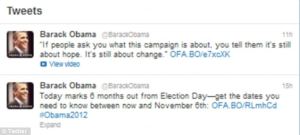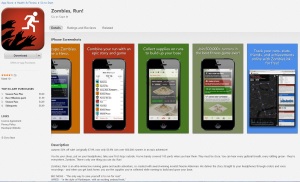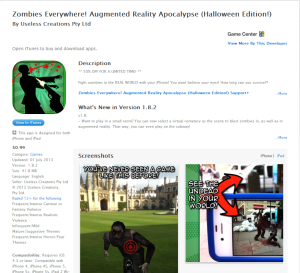Features of location based services and locative mobile social networks: Which of these features would be useful? and Privacy, surveillance, and social exclusion issues
Posted: October 11, 2013 in Elizabeth Azzopardi, social mediaTags: facebook, LMSN, Location-based service, Mobile social network, Privacy, Security, Social network, Surveillance
Features of location based services and locative mobile social networks: Which of these features would be useful?
And What are some of the privacy, surveillance, and social exclusion issues that arise from these features?
Automated information alerts when you travel near tagged locations, targeted advertising/specials when you travel near certain stores based on your interests, ability to locate your friends who are currently logged in through their status updates or in real time, ability to see information that your friends have left about a place; such as reviews tags and comments, ability to see profiles of anyone logged in the social networks in your physical area through status updates or real time, ability to comment on the profiles of anyone logged into the social networks in your physical area.
All of these features would be useful as part of a Locative Mobile Social Network (LMSN) app or game, but all have their own pros and cons which make the use of these features a problem in three key ways; privacy, surveillance, and social exclusion. There are ethical, and legal questions that come from the location based social uses of LMSNs, the opportunity to sell directly to a potential consumer through pacifically targeted LMSN advertising would be very valuable to businesses and advertising companies. However, it is obvious that if a user’s information is sold that there could be a violation of trust between an LMSN’s maker and its user, making the user less likely to then use the LMSN or recommend its use to their friends. It could be the future for advertising and in most cases an agreement to allow an LMSN maker to sell directly to an advertising company can be hidden in a user agreement without the user being aware of agreeing specifically to it. Privacy issues that would arise from being able to locate your friends through their status updates would be that depending on the privacy level that the person employees when using an LMSN, a person who may not be friends could be alerted to the users’ location, this poses a danger if a person seeks to misuse and potentially harm/stalk the user. The surveillance issues would be it makes other people aware of the users’ comings and goings, and it would make it easier for someone to stalk a user of an LMSN.
By Elizabeth Azzopardi
Below are some examples of augmented reality games, and potential LMSN apps.
Zombies, Run!
https://itunes.apple.com/au/app/zombies-run!/id503519713?mt=8
Zombies Everywhere! Augmented Reality Apocalpse (Halloween Edition)
https://itunes.apple.com/au/app/zombies-everywhere!-augmented/id530292213?mt=8&ign-mpt=uo%3D2
Urbanspoon website: http://www.urbanspoon.com/c/71/Melbourne-restaurants.html
They also do have an app for smart phones where people can leave reviews, etc.
Are Social Media becoming Political Media?
Posted: September 30, 2013 in class post, Daniel Kunelius\, social mediaTags: Broadcasting, Daniel Kunelius, facebook, First World problem, Party platform, Political media, Politics, social media, Twitter
We have used social media for a long time. Some people use it to complain about silly issues such as overpriced things or ‘first world problems’. There have been a few people who use it to spread a message. At first this was just for a few. People spreading their opinion about certain things hoping there was someone out there listening. Nowadays this is the only way to get people to listen.
Candidates have started to use social media more to ‘connect’ to the younger audience. This is far from perfect. Only a small percentage uses it on the daily. Most getting interns or assistants to do it all for them.
 Some tweets during the 2012 US Election
Some tweets during the 2012 US Election
People have stopped listening to the ‘real’ world. Facebook and twitter have become war zones for political battles, people commenting on others posts about how they are for one side not the other, and trolls spreading hate on political member’s walls.
In a way, most media become political media in the end. They’ll start off for personal or government use then used for propaganda and the only way people will listen. Think broadcast media and the Nazi party and how that evolved from simple media to a political platform for propaganda. Scene from Nazi demonstration during WWII
Scene from Nazi demonstration during WWII
Daniel Kunelius
http://www.thejakartapost.com/news/2013/05/07/political-wars-set-heat-social-media.html An article about how some Indonesian officials have recently started using social media to further their campaigns only to get into arguments with each other.
Can online activism become a major political force?
Posted: September 18, 2013 in class post, Elizabeth Azzopardi, social mediaTags: DDoS, Internet activism, Invisible Children, Joseph Kony, Kony 2012, Lord Resistance Army, slacktivism, Uganda, Video
Activism or slacktivism?
Are DDoS attacks the online equivalent of sit-ins or strikes?
Why did Kony 2012 fail?
Online activism can become a major political force, as seen by Invisible Children’s Kony 2012 video which advocated for the capture and trial of notorious criminal Joseph Kony and the Lord’s Resistance Army (LRA), for people to pressure government officials to make changes, and increased protection for civilians affected by the LRA.
Unfortunately because the Kony 2012 video exceeded the expectations of Invisible Children, they didn’t have enough time to harness and direct the positive social awareness into actual action that could have helped many people in Uganda. In the end the Kony 2012 campaign failed because the information they used in the video was out dated, openly contested by people in Uganda, and the video of the breakdown of the Kony 2012 video’s creator which went viral.
DDoS can be considered the online equivalent of a strike or sit-in; this is because it is a non-violent form of protest, as it overloading the server does not harm any people, although it could hurt companies or businesses who gather their revenue or work from their website.
by Elizabeth Azzopardi
Please visit http://invisiblechildren.com/kony/ to find more information about InvisibleChildren.
Great image related to the Kony 2012 campaign’s success
Can we expect to have privacy if we use social media?
Posted: September 11, 2013 in class post, Elizabeth Azzopardi, social mediaTags: Elizabeth Azzopardi, facebook, Instagram, Online and offline, Privacy, Security, social media, Twitter
Social media is by definition a social form of interaction with other people online.
We can see that social media does have a large issue in regards to privacy. I do not believe that it is possible for anyone to expect to have 100% privacy when using social media. Privacy policies do not cover anything fully. The possibility of posting something online and having others see it is extremely high, even if you aren’t friends with the person who sees it. The Internet is a public medium accessed by anyone, anytime you post online, even if you delete it, can leave traces or be put into a data file the user doesn’t know about. Often social media encourages you to put hash tags and other tags on things (photos, videos, text posts) you upload online so that people can look for it and other things like it, examples of these websites are Instagram, tumblr and twitter. Even if you do not tag a post if someone is friends with you, or follows you this could come up on their news feeds (Facebook), dashboard (tumblr) or home feed (Instagram). We can see then that it is pretty much irrational to expect 100% privacy when using social media.
By Elizabeth Azzopardi
http://phys.org/news/2013-05-social-media-plagued-privacy-problems.html
http://dashburst.com/online-privacy-concerns/
several articles about social media its alarming privacy concerns
Are we becoming digital Narcissists with social Media?
Posted: September 6, 2013 in class post, Daniel Kunelius\, social mediaTags: Camera phone, Daniel Kunelius, Digital, Digital camera, Narcissism, Narcissistic personality disorder, Narcissistic Personality Inventory, Photography
Short answer – yes we are becoming digital narcissists. In recent history we have become increasingly aware of our own image. It may have started with the digital camera where if we didn’t like an image we took we could easily erase the picture and try again. We strive for that perfect image that we can use that represents us and everyone who sees this image will know who we are (so it better be perfect). We see nearly all teenage girls and, in recent, teenage boys have taken thousands of “selfies” for that shot and to make themselves look as good as possible. I believe this helped pave the way for people to start being extremely self-aware of their image. In the beginning of the digital camera age we could only show our closest friends and family how hard we tried to get that perfect shot, then uploading to social media and camera phones became a thing and they use that as a platform for “hey look at me, I look good, see how many shots I took.”
Andrew Keen and his view on digital media (culture mirrors our digital selves)
People shall never see my profiles unless they ask. I do not subscribe to the narcissism that youth has acquired. I prefer privacy and it will continue this way.
Daniel Kunelius
http://www.huffingtonpost.ca/mitch-joel/the-future-of-media_b_2904412.html
http://www.theguardian.com/technology/2007/apr/29/news.newmedia
Some posts on digital narcissism and their views on it
Do social networking sites change human social tendencies or do they reflect them?
Posted: August 4, 2013 in class post, Elizabeth Azzopardi, enhancing social tendencies, social mediaTags: Elizabeth Azzopardi, facebook, Online Communities, social media, Social network, Social networking service, Socialization, Software and Services, Twitter
Do social networking sites change human social tendencies or do they reflect them? Both?
People have an inbuilt need for socialisation, and using things their peers are using in order to fit in with today’s society –
Social networks enhance human’s social tendencies by giving them the ability to communicate with each other much faster than ever before. In this digital age we can see in our day to day life how much human tendencies are supported by social media, if you go anywhere there are people constantly updating others in their friendship, work and family circles on their day to day life, interests and habits. This could be argued to do both change and reflect human’s social tendencies. It can be seen to change human’s social tendencies as we can now be social 24/7. And it can reflect them as it acts to support the way human’s socialise and even enhance it.
by Elizabeth Azzopardi
http://www.american.edu/soc/communication/upload/Caroline-Sheedy.pdf
some articles about how social media and the varying opinions on why social change is good/bad
If you were a Wikipedia editor what would you change about the Social Media entry? By Elizabeth
Posted: August 4, 2013 in class post, Elizabeth Azzopardi, social media, wikipediaTags: facebook, Pinterest, social media, Social network, Social networking service, Twitter, Wikipedia, wikipedia editor, YouTube
If I were to edit Wikipedia’s Social Media page I would say:
Social Media is a part of the development of the prosumer (involving user generated content in the online community) culture of the 21st century. Social Media involves the building of a social network that encourages people to communicate with each other. Prosumerism is the combination of the actions of producing and consuming, which is encouraged in the online communities such as Tumblr, Pinterest and Youtube. As the majority of the content available on Social networking platforms are user-generated this allows users to share, discuss, collaborate and change the content often, resulting in active social groups and activities. Social communication is growing at an incredible rate, with social networking sites such as Facebook and Twitter allowing us to communicate and cooperate with each other on a larger scale than ever before. Social Media allows for instant communication between people from different parts of the world using internet and mobile networks.
By Elizabeth Azzopardi
Major issue would be privacy not exclusiveness, it’s encouraged to combine your social media entries.
– Needs citations to back up facts and statements.
– Children exposed to images of smoking, alcohol, and sexual behaviours
– Chat rooms, including video chat
– Do parents know enough about what their children are doing on the internet and social media websites? Do they know that they can check the history even on phones?
– Facebook addictiveness
– Dunbar’s number 150
http://vitruviandesign.blogspot.com.au/2013/05/whats-wrong-with-wikipedia.html
http://news.cnet.com/2100-1038_3-5997332.html
Some articles about how wikipedia isn’t quite up to scratch
About us: can also be found in about tab
Posted: August 4, 2013 in social mediaTags: facebook, Google Chrome, Invisibility, Twitter
We are Daniel, Elizabeth, Hadi and invisible Paul.
Students of Victoria University studying Communication.
Except Invisible Paul, because he’s Invisible.
We write this to educate those who read it. And because we have no choice. And for Invisible rights everywhere.
Why 2013socialmediablog? nothing else seemed to fit properly
Why Socializzydanielhadi? because it is a combination of a class and all the names of the people who are involved.
peace out and please stay tuned, as always, for more content




